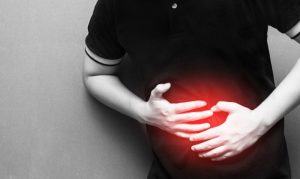
If left untreated, erosive gastritis can lead to other health problems. It can also lead to bleeding in the stomach and ulcer formation. Over time, some people may even develop stomach cancer, especially in those who have a thin stomach lining.
Also read: What causes excessive stomach acid and how to get rid of it
What causes erosive gastritis?
Many cases of the disease are associated with steroid, aspirin, and alcohol ingestion, making its prevalence high in these groups. Erosive gastritis also occurs in those suffering from head injuries, shock, major trauma, burns, and surgery.
Incidence of associated etiological factors (83 cases; multiple factors present in some cases)
| Associated factor | Incidence (%) |
|---|---|
| Aspirin & aspirin-containing drugs | 36 |
| Phenylbutazone | 5 |
| Steroids | 1.5 |
| Multiple drugs | 2.5 |
| Renal failure | 1.5 |
| Acute infections | 4 |
| Postoperative | 16 |
| Anticoagulants | 1.5 |
| Alcohol | 8 |
The two most common causes of gastritis are non-steroidal anti-inflammatory drugs and Helicobacter pylori infection. NSAIDs cause erosive gastritis more commonly, however.
Other potential causes of erosive gastritis include substances such as alcohol and cocaine. Psychological stress contributing to gastritis is a common misconception, but this has been found to be untrue. More accurately, the stress sustained from severe illnesses like burns, critical illness, extensive trauma, and major surgery are they types of stressors that can lead a gastritis symptoms.
Radiation exposure, autoimmune diseases, and other diseases of the stomach and cuts may also lead to erosive gastritis.
Erosive gastritis and NSAIDs
The reasons NSAIDs are the most common cause of erosive gastritis is because of their mechanism of action. The nature of the drugs is to inhibit prostaglandins—chemical messengers for inflammatory processes of the body. This is what makes these medications great for dealing with inflammation elsewhere in the body, but unfortunately, they have the side effect of inhibiting protective mucus production controlled by the same chemical messengers.
If a person chronically uses NSAID medications, they inadvertently reduce the production of mucus in the stomach, allowing for erosive stomach juices to contact the stomach lining. This leads to severe damage. Since NSAIDs shrink in the stomach when consumed, it explains why most of the erosion occurs on the greater curvature of the stomach wall.
Symptoms of erosive gastritis
The symptoms of erosive gastritis can be extremely uncomfortable and unpleasant. They may include:
- Bloating, flatulence, increased belching, indigestion, and/or change in stools
- Pain when consuming food and/or water
- Sudden loss of appetite
- Weight loss in a short period of time
- Nausea and vomiting
- Bleeding of the stomach (rare). Can appear in the stools or even when vomiting.
Diagnosing and treating erosive gastritis
Once visiting a doctor for a suspected stomach condition, they will investigate all possible causes of your presenting symptoms. By taking a full history, including past family history and social habits, your doctor will get a better picture what might be causing your abdominal cramping. Once the suspicion of erosive gastritis is made, several tests can be ordered to help support this diagnosis. They may include blood tests, stool culture, x-ray of the stomach and breath tests used to look for H. Pylori infection. Under serious circumstances, your doctor may find it necessary to obtain a biopsy of the stomach tissue.
Treatment is typically based on the suspected diagnosis given and combined with a modification of your diet. Most treatment regimens are used to prevent the condition from getting worse by avoiding certain causative food items such as caffeine and alcohol, but also by managing the types of foods eaten, choosing foods that don’t aggravate the condition.
It is generally recommended to avoid consuming whole grains, cereals, non-citrus fruits, green vegetables, and dairy products. You may also have to avoid acidic foods such as tomatoes, oranges, and pineapple.
Chronic cases of erosive gastritis are treated with antibiotics and other medications that help relieve pressure on the stomach lining. This helps when the cause for the condition is a bacterial infection. Patients will need to continue this antibiotic treatment until completion to have the best chances of complete resolution of their erosive gastritis symptoms.
Related:
What causes antral gastritis and how to treat it?
Burning Sensation in Stomach: Causes, Symptoms and Home Remedies